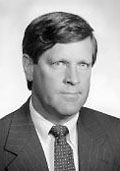Seattle City Council member Jim Compton says, “If an investigation means Watergate, this is not an investigation.” He told The Seattle Times that the “community wants closure on the WTO.” Earlier, he promised, the noninvestigation “will not be a witch hunt.”
When the words “closure” and “witch hunt” come up, another word comes to my mind. How about “whitewash”?
Compton and the council are currently trying to lower expectations for the WTO Accountability Review Committee. In fact, it seems like they’re trying to wish it away.
The committee is charged with examining events surrounding WTO week. It will have a small staff, a budget of $150,000, and several months to coordinate the work of four civilian panels that will do the probing.
The budget could have been much higher. Alec Fisken, who has been hired by the City Council as the committee staff director to run the WTO “review,” as he calls it, submitted several budgets, including one that was more than double the approved one. But the council chose the slimmed-down approach. Apparently, the city that thought it was worth spending more than $6 million in public money to host the WTO doesn’t want to pay any real costs for probing what went wrong. And they certainly weren’t considering costs in the millions, as other cities have spent on commissions in the wake of events like the Rodney King riots, but evidently even $350,000 was too high.
The committee will have no full-time lawyer, no full-time investigators, no special prosecutor. The two or three staffers Fisken will hire will be research coordinators, mainly charged with dealing with the panels and helping to organize and categorize the mounds of paper that the committee will accumulate and review. Fisken plans to hire a paralegal to assist in organizing this trail of paper, bits, and bytes.
A press release last week from Compton’s office said Fisken would be hiring “at least two staff investigators” for this noninvestigation, but Fisken says those folks are his people, essentially clerical staff.
There is money in the budget for some legal advice from an outside attorney and “some hours” for an investigator, but with only $150,000 dollars to dole out for everything including staff salaries, it can’t be much.
Fisken, who speaks with the stolid sincerity of a village librarian, sees his task as mainly gathering and organizing documents, which some people also mistakenly refer to as “facts.” Those documents will be available to the media, or any citizen for that matter, if they make the appropriate Open Public Records Act requests. It is a huge job simply to track down all the memos, e-mails, Web site data, planning documents, articles, and other ephemera that went into the city’s planning of WTO. Fisken will make “courtesy calls” on city officials to obtain their cooperation; he will ask for documents; he will sort them out into reviewable form.
Any probing will be up to the amateurs—I mean, the civilians—on the panels who will only have the power of a “review” process behind them. And whatever public pressure there might be for the truth to be discovered and accountability fixed.
In one respect, it may be just as well that City Council is doing so little, for the very idea that they are the appropriate body to conduct a WTO investigation is ludicrous. Not only are they players in the drama, they are at once enemies and allies of the mayor, the police, and many other officials who would be the target of such an investigation. And as such, they recognize that the WTO is a political minefield, a lose-lose for whoever gets involved. Just ask Paul Schell and Norm Stamper. So was Jim Compton acting statesmanlike when he appointed Alec Fisken, a primary rival for his City Council seat, to the staff job? Or was he cleverly sabotaging the competition?
These are the kinds of questions that arise when politicians do the “investigating,” as we learned watching the US Congress stumble through impeachment last year.
The people least happy with WTO week—and least happy to be pleased with whatever the council does or doesn’t do—are on all sides of the political spectrum, which also makes this noninvestigation perilous.
On the right are the cops and conservatives who think the city left the police hanging out to dry: Defenseless, outnumbered, unprepared for the tactics protesters employed, the police were put in jeopardy and left unsupported by their own leadership.
In the middle are many in the retail community who’d like to know why their storefronts were sacrificed and their shopping season gutted by the decision to let anarchists roam wild downtown and cops run wild on Broadway, not to mention the baffled bystanders at places like Pike Place Market who were gassed on family holiday outings.
On the left are the activists who will not be satisfied until punishment is meted out to the gassers, groin-kickers, and constitutional molesters who came down too hard on what was largely a nonviolent protest. Truth be told, some of these folks won’t be happy until government and capitalism are ground to dust, but there are plenty of other ordinary pissed-off people who want to know what really happened and why their sons and daughters were arrested or sprayed.
A noninvestigation won’t make anyone happy, but it is least likely to infuriate the community enough to create more political problems.
In fact, by June, the whole thing might just go away, buried in a pile of Alec Fisken’s neatly stacked papers.







